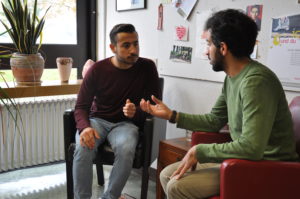
The pilot project for the support of psychologically burdened refugees, has been implemented throughout the district of Constance since the summer of 2017. The aim of the project to improve access to the health system for refugees has been successfully implemented. The project networks, qualifies and supports the existing resources in the district of Constance.
More than 40 psychotherapists in private practice have now been trained and receive administrative support. Suitable persons from the same regions of origin of the patients have been trained as peer guides. Currently 10 health guiides are working in the project. Under the supervision of the coordinating office, which is staffed by psychologists with clinical experience, they take over the care of the mentally burdened refugees. In addition to language mediation, the tasks of the guides are to inform refugees about mental disorders and therapy options and to motivate them to help arrange and keep appointments, to mediate in the event of problems or misunderstandings, to recognise crises and, if necessary, to intervene under the supervision of the psychotherapists treating them. Additionally, 10 language mediators were trained in the project.
In 2019 about 30 psychotherapies were supported by the project. Thanks to the financial support of the city of Constance, the district of Constance, the city of Singen and the Lions Club “zur Katz” e.V., it was possible for the association to employ the health guides within the framework of a mini-job contract, to reimburse interpreter and travel expenses and to pay a coordination office.
In cooperation with the Department of Clinical Psychology at the University of Konstanz, an evaluation is being carried out to accompany the project. In the last evaluation round until autumn 2019, it could be shown that the functioning in everyday life and the psychological stress significantly improved for the participating refugees as a result of the project activities (Reitter, 2019). The majority of the therapists stated that they had been enriched by their participation in the project. The survey of the health sponsors revealed that the burden of project work was within the normal range of social professions as a result of the close support provided by supervision and training.

The pilot project for the support of psychologically burdened refugees, has been implemented throughout the district of Constance since the summer of 2017. The aim of the project to improve access to the health system for refugees has been successfully implemented. The project networks, qualifies and supports the existing resources in the district of Constance.
More than 40 psychotherapists in private practice have now been trained and receive administrative support. Suitable persons from the same regions of origin of the patients have been trained as peer guides. Currently 10 health guiides are working in the project. Under the supervision of the coordinating office, which is staffed by psychologists with clinical experience, they take over the care of the mentally burdened refugees. In addition to language mediation, the tasks of the guides are to inform refugees about mental disorders and therapy options and to motivate them to help arrange and keep appointments, to mediate in the event of problems or misunderstandings, to recognise crises and, if necessary, to intervene under the supervision of the psychotherapists treating them. Additionally, 10 language mediators were trained in the project.
In 2019 about 30 psychotherapies were supported by the project. Thanks to the financial support of the city of Constance, the district of Constance, the city of Singen and the Lions Club “zur Katz” e.V., it was possible for the association to employ the health guides within the framework of a mini-job contract, to reimburse interpreter and travel expenses and to pay a coordination office.
In cooperation with the Department of Clinical Psychology at the University of Konstanz, an evaluation is being carried out to accompany the project. In the last evaluation round until autumn 2019, it could be shown that the functioning in everyday life and the psychological stress significantly improved for the participating refugees as a result of the project activities (Reitter, 2019). The majority of the therapists stated that they had been enriched by their participation in the project. The survey of the health sponsors revealed that the burden of project work was within the normal range of social professions as a result of the close support provided by supervision and training.


